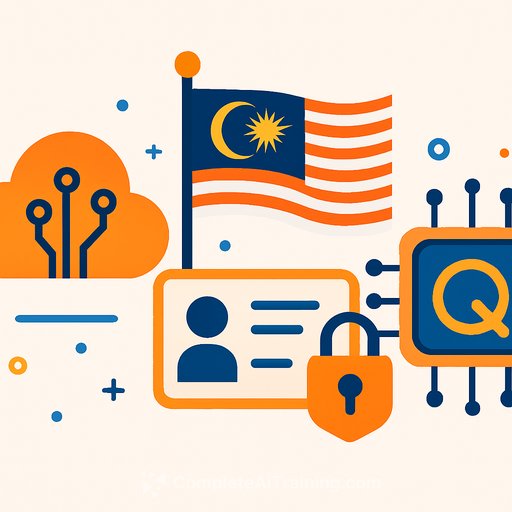Malaysia to establish a sovereign AI cloud: what public sector leaders need to do next
Malaysia will establish a sovereign AI cloud to secure national AI capabilities, support government services, and accelerate digital development. The decision followed the National Digital Economy and 4IR Council (MED4IRN) meeting chaired by Prime Minister Anwar Ibrahim.
The council also advanced initiatives tied to MyDigital ID, MyGov Malaysia, and a proposed National Quantum Policy, signaling a coordinated push to make Malaysia an AI-driven nation by 2030.
Why a sovereign AI cloud matters for government
- Data sovereignty: Sensitive datasets stay within national borders and under Malaysian law.
- Security and continuity: Greater control over access, monitoring, and incident response for critical services.
- Standards and compliance: Consistent policies for identity, audit, encryption, and records management.
- Local capacity: Builds public-sector skills and a domestic vendor ecosystem around AI workloads.
Council decisions and focus areas
- MyDigital ID: Strengthening implementation to underpin secure access and seamless citizen services.
- MyGov Malaysia: Cross-ministry cooperation to improve integration, reliability, and user experience.
- National Quantum Policy: Establishing a National Quantum Task Force to prepare for quantum advances and the Q-Day threat.
- 2030 target: Coordinated actions to position Malaysia as an AI-driven nation by the end of the decade.
Actions for ministries and agencies in the next 90 days
- Classify data and workloads: Identify systems suitable for migration to the sovereign AI cloud; flag high-sensitivity datasets.
- Map priority use cases: Start with services that benefit from AI-assisted operations (case handling, citizen support, analytics).
- Set procurement baselines: Require security-by-design, auditability, API-first integration, and portability to avoid lock-in.
- Enforce security controls: Encryption in transit/at rest, key management, monitoring, and secure model lifecycle practices.
- Plan for post-quantum: Inventory cryptography in use and build a phased migration plan to quantum-resistant algorithms.
- Interoperability: Align to shared data models and APIs for MyGov Malaysia and MyDigital ID.
- Skills and governance: Assign an AI lead, define approval workflows, risk reviews, and audit trails.
- Pilots with metrics: Run controlled pilots on the sovereign cloud with clear success criteria before scaling.
Quantum readiness and the Q-Day risk
The endorsed National Quantum Policy and Task Force address the risk that future quantum capabilities could break today's encryption. Agencies should adopt crypto-agility: know where cryptography is used, prioritize high-value systems, and prepare tested migration paths to quantum-resistant standards.
For technical teams, track guidance on quantum-safe cryptography from authoritative bodies like NIST. See the project overview and candidate algorithms here: NIST Post-Quantum Cryptography.
Implementation guardrails
- Ethics and bias controls: Dataset documentation, fairness checks, human-in-the-loop for sensitive decisions.
- Audit and logging: Full traceability for data access, model versions, prompts, and outputs.
- Vendor diversification: Use open standards and containerized deployments to keep portability options.
- Cost governance: Budgets with unit economics, quotas, and workload scheduling to prevent overruns.
- Incident readiness: Update playbooks for model misuse, data leakage, and adversarial content handling.
Coordination for success
- Nominate an agency focal point to coordinate with MED4IRN and the National Quantum Task Force.
- Share reusable components: reference architectures, data schemas, and risk checklists.
- Report quarterly on adoption, security posture, and public service outcomes to guide funding and scale-up.
Resources
- MyGov Malaysia Portal
- NIST Post-Quantum Cryptography
- Complete AI Training: Courses by Job (for structured upskilling of civil service teams)
Your membership also unlocks:






